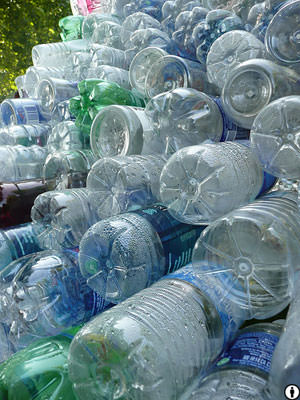Lousy Sex Life? Blame Plastic
A study has found that workers exposed to high levels of bisphenol A, a chemical widely used in the manufacture of plastics and other consumer goods, were at least four times likelier to report sexual problems, including erectile dysfunction. (continued)
A study has found that workers exposed to high levels of bisphenol A, a chemical widely used in the manufacture of plastics and other consumer goods, were at least four times likelier to report sexual problems, including erectile dysfunction.
The men surveyed for Kaiser Permanente’s research had been exposed to much larger quantities of the stuff than the average bottled water drinker, but the data appear to back up similar findings in animals.
BPA is most commonly found in Type 7 and Type 3 plastic containers (look for the number inside the triangular recycling symbol on plastic products). — PZS
Your support matters…WebMD Health News:
Compared to the unexposed factory workers in the study, BPA-exposed workers were four times more likely to report erectile dysfunction, low sexual desire, and less than optimal satisfaction with their sex lives. They were seven times more likely to report problems with ejaculation.
The findings must be replicated to prove the link between high levels of exposure to BPA and sexual dysfunction in men, Kaiser Permanente reproductive epidemiologist De-Kun Li, MD, PhD, tells WebMD.
“We also need to study lower levels of exposure closer to those consumers get,” he says. “But up until this point the critics have dismissed the idea that BPA has health effects at any level because most of the research has been in animals. They can no longer do this.”
Independent journalism is under threat and overshadowed by heavily funded mainstream media.
You can help level the playing field. Become a member.
Your tax-deductible contribution keeps us digging beneath the headlines to give you thought-provoking, investigative reporting and analysis that unearths what's really happening- without compromise.
Give today to support our courageous, independent journalists.





You need to be a supporter to comment.
There are currently no responses to this article.
Be the first to respond.